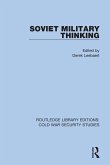The second of a series, this study analyzes the historical relationships between the provision of military assistance and success in achieving Soviet aims during the Cold War. Mott looks at Soviet donor-recipient relationships across seventeen case studies to identify the generalities or regularities that relate the classical wartime relationship to achievement of donor Cold War aims. He refines the four critical features of the wartime donor-recipient relationship--convergence of donor and recipient aims, donor control, commitment of donor military forces, and coherence of donor policies and strategies--to reflect the unique political economic constraints of the Cold War. Findings challenge orthodox separation of politics, history, military science, and economics, and refute the common wisdom that economic aid is a more effective policy instrument than military assistance. Mott contends that both successes and failures of Cold War Soviet military assistance were predictable, explicit consequences of donor policies and strategies and of convergence of donor and recipient aims. This book presents a pattern for both policy development and theoretical analysis in which military assistance is a viable, robust policy option and bilateral relationship with a clear set of requirements, features, processes, and predictable results. Its primary methodology is the search for uniformities across historical observations through low-level, ordinary, multivariate regressions. Each chapter focuses on Soviet military assistance in a region and refines the relevant features of the observed relationships into a tentative pattern for comparison with other regions.
Hinweis: Dieser Artikel kann nur an eine deutsche Lieferadresse ausgeliefert werden.
Hinweis: Dieser Artikel kann nur an eine deutsche Lieferadresse ausgeliefert werden.








